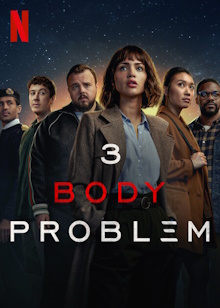After having read the entire trilogy, I was always going to watch this Netflix series even though I quickly noped out of the Chinese adaptation. There was no way I was going to be able to sit through 30 episodes and so much repetitive content. This English-language version makes big changes to the story, moving most of the scenes to England for example and more importantly creating a new set of characters, the so-called Oxford Five, to serve as the protagonists. I’d say that the changes are for the better as it does away with the marked misogyny of Liu Cixin’s work and makes for a more varied and interesting cast. On the other hand, it is somewhat implausible that the chief of the MI6 would take such a central role in leading the defense of Earth and it really needed more extras to portray the sheer scale of the events. Overall it’s a good adaptation and managing to convey so much of the story in only eight episodes is commendable. I’ll definitely be waiting for the next season.
Scientists all over the world are turning up dead, either by suicide or being murdered, and report that scientific experiments yield results that are nonsense. When Oxford physicist Vera Ye kills herself, a group of her former students gather to attend her funeral. Clarence Shi, a British detective who is investigating the deaths under orders from his superior Thomas Wade, keeps up surveillance of them. One of the students, Jin Cheng, comes across an impossibly advanced virtual reality headset at Vera’s house and the mother Ye Wenjie lets her keeps it. The device invites players into a game set on an alien planet where all life is periodically wiped out by myriad disasters. Another former student Auggie Salazar who is working on making nanofibers starts seeing a countdown in her line of vision visible only to her and a mysterious woman warns her to shut down her project. Meanwhile flashback scenes reveal Ye Wenjie’s past in China, how her father was killed during the Cultural Revolution and she herself punished. Her experiences embitter her against humanity and later she meets Mike Evans, an environmentalist who is similarly disdainful of human civilization. Assigned to work at a radio telescope to search for extraterrestrial life, she receives a signal from aliens and secretly invites them to Earth, believing that they can save humanity.
I already know the whole story of course so all of the fun is in seeing exactly how they chose to adapt it. I was leery at first about splitting the character of Wang Miao into so many others but it turns out to be a brilliant move. This offers more diverse perspectives with each character having distinct roles and actually sets the stage for including storylines from the later two novels of the trilogy. The result is arguably better than the source material as the overall plot is now more cohesive. This first season therefore includes not only Ye Wenjie’s origin story so to speak and the efforts of Earth’s governments to take down the alien-worshipping cult she built. It also includes the UN’s Wallfacer program and the Staircase Project which don’t show up in the books until much later. It’s ambitious to include so much in one season and it’s quite impressive how well they managed to fit everything in. I do think that this harms the show’s believability. There is so much going on and the scope of the projects is so large than the cast feels small as a consequence. Could the many governments of Earth entrust so much in Wade? There should be way more everything, more soldiers, more scientists, larger staging sites, and so on. This is one area in which the Chinese show is arguably better, simply because they can throw in more extras to depict the truly global scale of what is going on.
I thought it was great how the series started with a scene set during the Cultural Revolution and continually flashed back to Ye Wenjie’s life in China through the years. It seems that the showrunners deliberately hired Derek Tsang to direct the first two episodes to get it right and Chinese audiences appreciated it because the mainland series apparently wasn’t allowed to show these scenes at all. Unfortunately once the show was done with Ye’s backstory, that was the end of China’s involvement. We do get a scene at the UN headquarters with Saul, one of the five friends, but otherwise this is a very UK-centered show which makes it feel quaintly provincial. Author Liu Cixin’s comment on how strange it is that the defense of Earth is led by a group of classmates who all know each other is rather apt. As my wife noted, it’s implausible how these top scientists and engineers of Earth are so young and relatively good-looking, giving this series an unwelcome CW Network-type look.
I suppose these are the compromises needed to sell what is otherwise a fairly complex plot with big science-fiction ideas to Western audiences. I appreciate the fast pace and how much it was able to cram in, so I definitely will be down for later seasons. I found it amusing that the showrunners here are David Benioff and D. B. Weiss who were badly excoriated after the poorly received final season of Game of Thrones. Their work here however proves that when provided with the proper source material, they do understand the subject very well and are very competent at adapting it for television.
